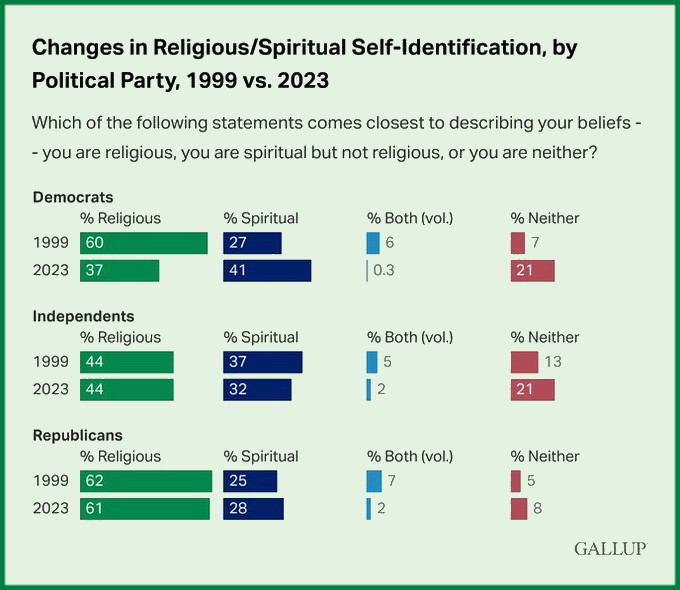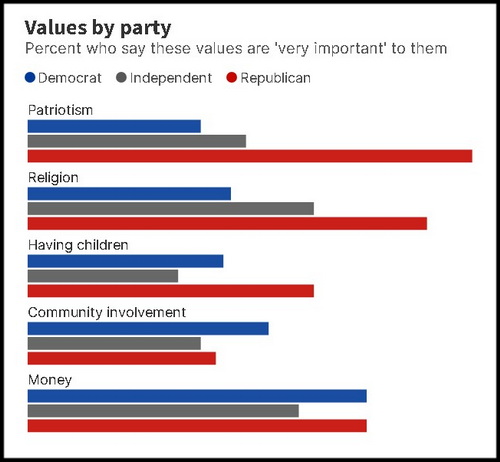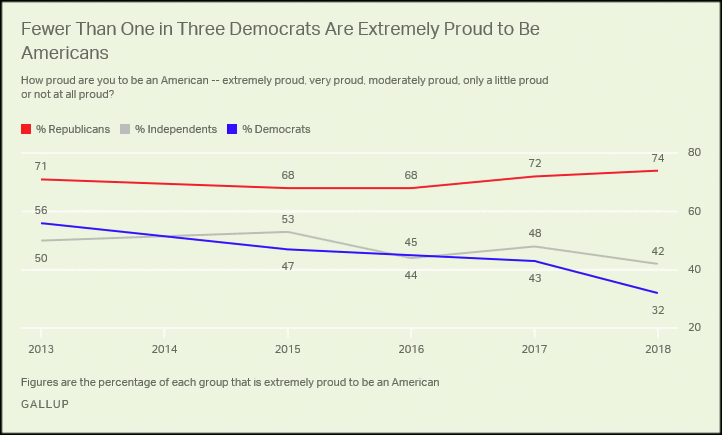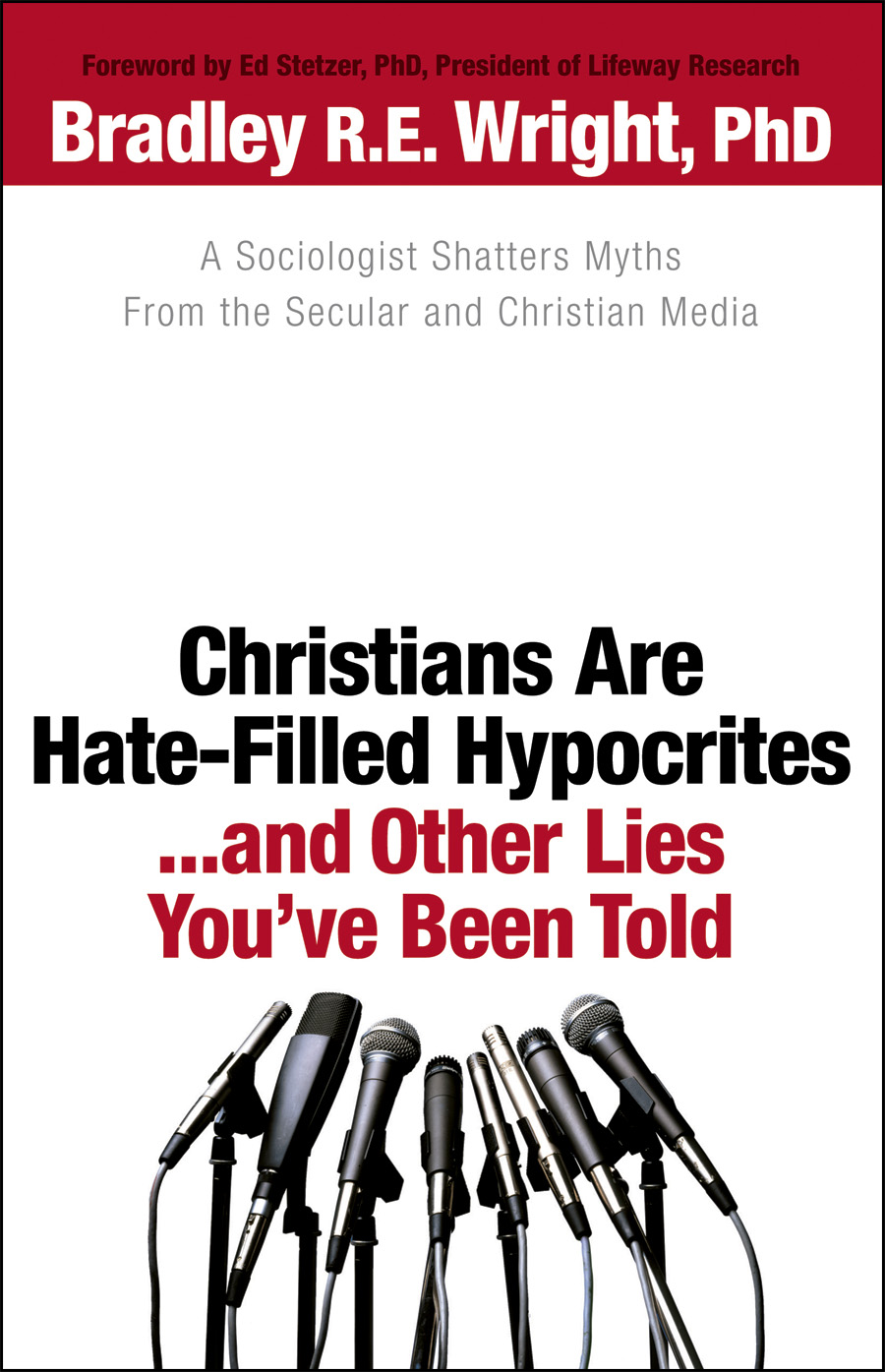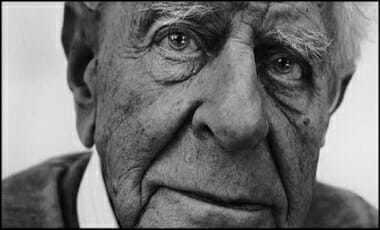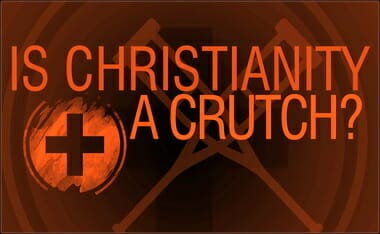ORIGINALLY POSTED IN 2013
LONG UPDATE:
This update will be placed at the top as it is key as you go through this post that the “negative [-] and positive [+] values” have changed since many of these stats came out. And note as well, that this means “Party” values/comparison “negative [-] and positive [+] values” have changed as well. Quite a bit:
GALLOP has more on the above:
Partisanship, Age Biggest Differentiators of Religiosity and Spirituality
The greatest variation in religious or spiritual beliefs is seen by party identification and age.
Among party groups, Republicans are the most likely to identify as religious, with 61% doing so, while 28% say they are spiritual. More independents say they are religious (44%) than spiritual (32%), while Democrats are about equally as likely to say they are spiritual (41%) as religious (37%).
Twenty-one percent of both Democrats and independents say they are neither religious nor spiritual, compared with 8% of Republicans.
BREITBART zeroes in a bit on this political change:
…Indeed, a Gallup poll from June 2022 found that belief in God has fallen the most in recent years among young adults and people on the left of the political spectrum.
“These groups show drops of ten or more percentage points comparing the 2022 figures to an average of the 2013-2017 polls,” that survey found. “Most other key subgroups have experienced at least a modest decline, although conservatives and married adults have had essentially no change.”
“The groups with the largest declines are also the groups that are currently least likely to believe in God, including liberals (62 percent), young adults (68 percent) and Democrats (72 percent). Belief in God is highest among political conservatives (94 percent) and Republicans (92 percent), reflecting that religiosity is a major determinant of political divisions in the U.S.,” the survey report continues.
Similarly, a Wall Street Journal poll released in March found that while 49 percent of respondents say, “I know God really exists, and I have no doubts about it,” only 39 percent say religion is “very important” to them….
As A PREVIOUS POST OF MINE notes as well, this religious trend affects Party Patriotism as well:
Republicans, Holding the Patriotic Line!
…Currently, 32% of Democrats — down from 43% in 2017 and 56% in 2013 — are extremely proud. The decline preceded the election of Donald Trump but has accelerated in the past year.
Less than half of independents, 42%, are also extremely proud. That is down slightly from 48% a year ago, and 50% in 2013.
As has typically been the case, Republicans are more inclined to say they are extremely proud to be Americans than are Democrats and independents. Seventy-four percent of Republicans are extremely proud, which is numerically the highest over the last five years….
(GALLUP)
This is the Democrat base… and influences Democratic politics. It BOOS GOD | ISRAEL being in the Democrat platform. It tries to get rid of God from the pledge (“Democrats and independents were more likely than Republicans to think the phrase should be taken out“). It tries to force religious people to pay for abortions. Here is BREITBART:
This Fourth of July, according to a recent Pew survey, 60% of full-spectrum “Solid Liberals” are not proud to be Americans.
The Pew Research survey found that just 40% of so-called Solid Liberals “often feel proud to be American” while “60% say that characterization does not fit them.”
According to the comprehensive survey, 69% of Solid Liberals are white, and 41% are under 40 years of age. They make up 15% of the general public and 17% of registered voters. Almost unanimously they love President Barack Obama – 84% approve Obama’s job performance, “with 51% approving very strongly.”
Among all Americans, Obama is considered to be the worst president since World War II, according to a recent Quinnipiac poll (2014).
In addition, 80% of this group believe that “racial discrimination is the main reason why many blacks can’t get ahead these days,” 87% think abortion should be legal in almost all circumstances, and 83% say “the government should do more to help the needy, even if it means going deeper into debt.”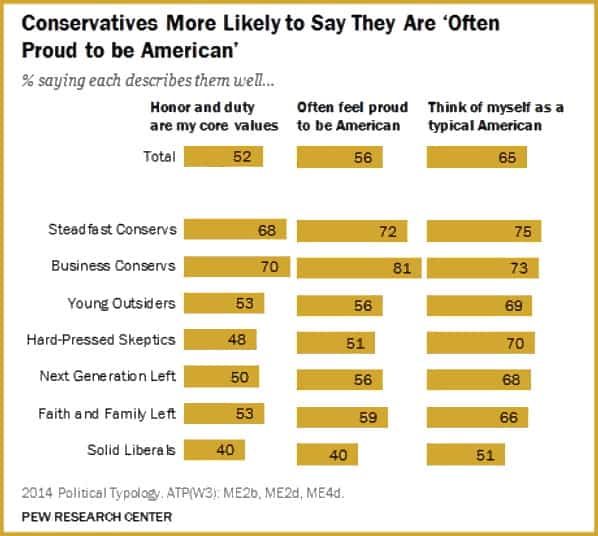
Pew also found that 52% of Solid Liberals “have college degrees and 21% have graduate degrees” while “45% say if they could live anywhere they wanted, they would live in a city.” While 93% of Solid Liberals believe that “stricter” environmental regulations are worth the cost, only “12% say the description ‘hunter, fisher or sportsman’ fits them well, the lowest share of any typology group.”
(Click Graph To Enlarge)
Conservatives are significantly prouder to be Americans.
Pew’s survey found that “81% of Business Conservatives and 72% of Steadfast Conservatives say the phrase ‘often feel proud to be American’ describes them well.” Pew also concluded that the “feelings of pride in being American – and a belief that honor and duty are core values – are much more widespread among the two conservative groups than the other typology groups.”
END OF UPDATE
I found this title of an article very myopic, ill-considered. You will see what I mean as we get into it, but first, here is the title of the article, “Atheists Have Stronger Family Values Than Evangelical Christians.” Not only is the title ill-considered, but the arguments within the article are as well. Divorce, crime, and the like are mentioned in the article, and as we will see later, the 2009 info is a bit twisted… but I will deal with some other issues first. Here is the crux of the article:
The original findings about divorce among non-believers are borne out by a 2009 comparison of geographical regions by the U.S. Census Bureau: the Northeast, known as the home of educated liberals (both liberalism and high levels of education correlate with atheism), has the lowest divorce rate, while the Bible Belt has the highest.
The gap between what evangelicals preach about morality and what they do extends beyond their love lives. Federal Bureau of Prisons numbers show that Christians commit more crimes per person than atheists, who commit fewer than the followers of any religion.
(CONSERVAPEDIA has a wonderful “drilling down” on this)
Mind you I realize I am stomping around “The Ecological Fallacy,” but this is a powerful cumulative case that the above is not just wrong, but very wrong. Also note this will turn out to be a battle between committed Christians, nominal Christians and the secular person. In the end you will see that if you were to have your taxes done, you would want them done by a committed Christian. That aside, one should also note that histories biggest mass murderers are atheistic in their cosmology, but conservative Christians who understand the ENTIRETY of their faith, commit less crime than all others in these stats. For instance, Prager did a show on these findings that shows that people who only believe in heaven (universalism, e.g., liberal theology) commit more crimes than those who believe in both heaven and hell.
Heaven or Hell? The Sinners Crutch!
FROM VIDEO DESCRIPTION
In this “Ultimate Issues Hour,” Dennis Prager discusses “Ultimate Justice” (God’s justice and otherwise) and justice’s involvement/affect in/on behavior. A new study reveals that belief in hell [and heaven] predicted a lower crime rate; belief in heaven predicted more crimes. Dennis tackles this hard to explain — or is it — issue.
This is uploaded because of an article by a detective and Christian apologist that likewise deals head-on with these questions as well (J. Warner Wallace). Detective Wallace says, “Criminals who justify their actions with religious doctrines are typically woefully ignorant of (or purposefully distorting) these doctrines,” I concur. Having been in jail for almost a full year-and-a-half with three felonies, I know first hand the psychological crutch religion can play, rather than the Refiner’s Fire Christianity is meant to be (Zechariah 13:9, 1 Peter 1:7, Job 23:10, Isaiah 48:10).
I will add that “Liberalism,” wherever it is applied (politics, economics, faith, ethics, and the like), harms immeasurably the actions of those involved in it. Theology is no less hurt by this progressive matrix.
Just the latest example of this are those that are opposed to pro-lifers support of a bill that will stop late-term abortions. They can be heard chanting “hail Satan” in response to others singing “Amazing Grace.” As well as “fu*k the church!” The Democrats that once supported and made up John F. Kennedy’s base would not recognize the liberal Democratic party of today. Which is why Dennis says (as well as Reagan) that the Democratic Party left them, not the other way around.
See Detective Warner’s ministry: http://pleaseconvinceme.com/
But there are other parts of this article that interest me. It is this: “both liberalism and high levels of education correlate with atheism,” the far left site, Daily Kos, agrees as well. Higher education leads to a higher pay as well… this will become important in dismantling a popular myth. This fact disproves many mantras and myths that the political Left. So lets delve into my thoughts on this. And this begins the complexity of what “family values” are, and it is a myriad of positions. Okay, let us divide political positions firstly:
A Gallup Poll shows that 40% of Republicans say they attend church weekly. Twenty-one percent say they attend nearly weekly or monthly, and 38% say they seldom or rarely go to church.
Compare that to only 27% of Democrats who say they go to church every week, 20% who say they go monthly and 52% of Democrats who say they seldom or never go to church. These polls also show that Democrats are less religious than the average American, and Republicans are more religious. Consider this: Almost one in five Democrats identify with no religious faith compared to only one in 10 Republicans who feel that way. (CNN)
Keep in mind that when “Republicans” are mentioned below, they have a higher percentage serious Christians. Here we go. During the 2000 elections (I know these stats are old, but all of this holds true today) an interesting stat caught my attention:
Once in awhile stats are done to see which part of the country (which states in fact) give more to charity per-capita than other states. Do you know which of the top twenty states gives the most to charity? You got it, Bush country! Every single one of the red states in that top-twenty are the middle-income fly-over states. Guess how many red-states got the lower twenty of giving? Two. Eighteen States that were in the lowest giving ratio to charity were Gore states. This is even more interesting with a few recent poles. Just under 66-percent republicans go to church one-to-two times a week. Just fewer than 66-percent democrats do not even go to church once a week. DRAT those nasty religious / conservatives! (From a very old post from my BlogSpot days)
This is important for the conversation. According to the very left leaning Daily Kos, most atheists vote Democrat now, harkening back to the 2000 election stats above, what does this mean? They are selfish? Stingy? You decide.
BIDEN (Politico):
- When the Obama campaign released past tax returns for Biden in 2008, it was revealed that the Bidens donated just $3,690 to charity over 10 years — an average of $369 a year.
OBAMA (WaPo):
- 2005: $77,315 to charity out of income of $1.66 million (4.6 percent)
- 2004: $2,500 out of $207,647 (1.2 percent)
- 2003: $3,400 out of $238,327 (1.4 percent)
- 2002: $1,050 out of $259,394 (0.4 percent)
From GATEWAY PUNDIT:
Obama charitable contributions
Democratic presidential candidate Barack Obama and his wife Michelle gave $10,772 of the $1.2 million they earned from 2000 through 2004 to charities, or less than 1 percent, according to tax returns for those years released today by his campaign.
The Obamas increased the amount they gave to charity when their income rose in 2005 and 2006 after the Illinois senator published a bestselling book. The $137,622 they gave over those two years amounted to more than 5 percent of their $2.6 million income.
Romney charitable contributions
Tax year Taxable income Charitable donations Donations as % of income
- 2010 $21.7 million $2.98 million 13.73%
- 2011 (est) $20.9 million $4 million 19.14%
Why bring up the Blue State and Red State divide and recent elections? Because is shown in every poll by Gallop (since this category was started), that Republicans are happier than Democrats ~ Giving and helping increase happiness, not dependence on government. Now, how bout church attendance, how does this strengthen family and thus family values?
We know that the left/right divide is an indicator of church attendance, how does regular church attendance break down into crime, and a healthy, happy life? Here are some indicators:
SOCIAL SCIENTISTS AGREE
- Religious Belief Reduces Crime Summary of the First Panel Discussion Panelists for this important discussion included social scientists Dr. John DiIulio, professor of politics and urban affairs at Princeton University; David Larson, M.D., President of the National Institute for Healthcare Research; Dr. Byron Johnson, Director of the Center for Crime and Justice Policy at Vanderbilt University; and Gary Walker, President of Public/Private Ventures. The panel focused on new research, confirming the positive effects that religiosity has on turning around the lives of youth at risk.
- Dr. Larson laid the foundation for the discussion by summarizing the findings of 400 studies on juvenile delinquency, conducted during the past two decades. He believes that although more research is needed, we can say without a doubt that religion makes a positive contribution.
- His conclusion: “The better we study religion, the more we find it makes a difference.” Previewing his own impressive research, Dr. Johnson agreed. He has concluded that church attendance reduces delinquency among boys even when controlling for a number of other factors including age, family structure, family size, and welfare status. His findings held equally valid for young men of all races and ethnicities.
- Gary Walker has spent 25 years designing, developing and evaluating many of the nation’s largest public and philanthropic initiatives for at-risk youth. His experience tells him that faith-based programs are vitally important for two reasons. First, government programs seldom have any lasting positive effect. While the government might be able to design [secular/non-God] programs that occupy time, these programs, in the long-term, rarely succeed in bringing about the behavioral changes needed to turn kids away from crime. Second, faith-based programs are rooted in building strong adult-youth relationships; and less concerned with training, schooling, and providing services, which don’t have the same direct impact on individual behavior. Successful mentoring, Walker added, requires a real commitment from the adults involved – and a willingness to be blunt. The message of effective mentors is simple. “You need to change your life, I’m here to help you do it, or you need to be put away, away from the community.” Government, and even secular philanthropic programs, can’t impart this kind of straight talk.
- Sixth through twelfth graders who attend religious services once a month or more are half as likely to engage in at-risk behaviors such as substance abuse, sexual excess, truancy, vandalism, drunk driving and other trouble with police. Search Institute, “The Faith Factor,” Source, Vol. 3, Feb. 1992, p.1.
- Churchgoers are more likely to aid their neighbors in need than are non-attendees. George Barna, What Americans Believe, Regal Books, 1991, p. 226.
- Three out of four Americans say that religious practice has strengthened family relationships. George Gallup, Jr. “Religion in America: Will the Vitality of Churches Be the Surprise of the Next Century,” The Public Perspective, The Roper Center, Oct./Nov. 1995.
- Church attendance lessens the probabilities of homicide and incarceration. Nadia M. Parson and James K. Mikawa: “Incarceration of African-American Men Raised in Black Christian Churches.” The Journal of Psychology, Vol. 125, 1990, pp.163-173.
- Religious practice lowers the rate of suicide. Joubert, Charles E., “Religious Nonaffiliation in Relation to Suicide, Murder, Rape and Illegitimacy,” Psychological Reports 75:1 part 1 (1994): 10 Jon W. Hoelter: “Religiosity, Fear of Death and Suicide Acceptibility.” Suicide and Life-Threatening Behavior, Vol. 9, 1979, pp.163-172.
- The presence of active churches, synagogues… reduces violent crime in neighborhoods. John J. Dilulio, Jr., “Building Spiritual Capital: How Religious Congregations Cut Crime and Enhance Community Well-Being,” RIAL Update, Spring 1996.
- People with religious faith are less likely to be school drop-outs, single parents, divorced, drug or alcohol abusers. Ronald J. Sider and Heidi Roland, “Correcting the Welfare Tragedy,” The Center for Public Justice, 1994.
- Church involvement is the single most important factor in enabling inner-city black males to escape the destructive cycle of the ghetto. Richard B. Freeman and Harry J. Holzer, eds., The Black Youth Employment Crisis, University of Chicago Press, 1986, p.354.
- Attending services at a church or other house of worship once a month or more makes a person more than twice as likely to stay married than a person who attends once a year or less. David B. Larson and Susan S. Larson, “Is Divorce Hazardous to Your Health?” Physician, June 1990. Improving Personal Well-Being
- Regular church attendance lessens the possibility of cardiovascular diseases, cirrhosis of the liver, emphysema and arteriosclerosis. George W. Comstock amd Kay B. Patridge:* “Church attendance and health.”* Journal of Chronic Disease, Vol. 25, 1972, pp. 665-672.
- Regular church attendance significantly reduces the probablility of high blood pressure.* David B. Larson, H. G. Koenig, B. H. Kaplan, R. S. Greenberg, E. Logue and H. A. Tyroler:* ” The Impact of religion on men’s blood pressure.”* Journal of Religion and Health, Vol. 28, 1989, pp.265-278.* W.T. Maramot:* “Diet, Hypertension and Stroke.” in* M. R. Turner (ed.) Nutrition and Health, Alan R. Liss, New York, 1982, p. 243.
- People who attend services at least once a week are much less likely to have high blood levels of interlukin-6, an immune system protein associated with many age-related diseases.* Harold Koenig and Harvey Cohen, The International Journal of Psychiatry and Medicine, October 1997.
- Regular practice of religion lessens depression and enhances self esteem. *Peter L. Bensen and Barnard P. Spilka:* “God-Image as a function of self-esteem and locus of control” in H. N. Maloney (ed.) Current Perspectives in the Psychology of Religion, Eedermans, Grand Rapids, 1977, pp. 209-224.* Carl Jung: “Psychotherapies on the Clergy” in Collected Works Vol. 2, 1969, pp.327-347.
- Church attendance is a primary factor in preventing substance abuse and repairing damage caused by substance abuse.* Edward M. Adalf and Reginald G. Smart:* “Drug Use and Religious Affiliation, Feelings and Behavior.” * British Journal of Addiction, Vol. 80, 1985, pp.163-171.* Jerald G. Bachman, Lloyd D. Johnson, and Patrick M. O’Malley:* “Explaining* the Recent Decline in Cocaine Use Among Young Adults:* Further Evidence That Perceived Risks and Disapproval Lead to Reduced Drug Use.”* Journal of Health and Social Behavior, Vol. 31,* 1990, pp. 173-184.* Deborah Hasin, Jean Endicott, * and Collins Lewis:* “Alcohol and Drug Abuse in Patients With Affective Syndromes.”* Comprehensive Psychiatry, Vol. 26, 1985, pp. 283-295. * The findings of this NIMH-supported study were replicated in the Bachmen et. al. study above.
(From a post entitled “Love“)
(Also see 52 REASONS TO GO TO CHURCH) These indicators are also mentions in a Heritage Foundation article, “Why Religion Matters: The Impact of Religious Practice on Social Stability“
100) Moral Values of Theists vs. Atheists
The rise of the “New Atheism” has led to the claim by its major proponents that atheism is morally superior to theism and that the world would be better off if the entire population were composed only of atheists. A new study raises doubts about that claim. Do people need God to be good? Daniel Dennett’s Breaking the Spell: Religion as a Natural Phenomenon, Richard Dawkins’s The God Delusion, Chris Hedges’ American Fascists, Sam Harris’s Letter to a Christian Nation, and Christopher Hitchens’s God Is Not Great all claim that theism (and Christianity in particular) is morally inferior to Atheism. Dawkins goes on to daim that religion is a form of child abuse that should not be taught to young children. However, a recent study by Reginald W. Bibby, Board of Governors Research Chair in the Department of Sociology at the University of Lethbridge, Canada, shows that atheists rate several moral values less important than theists do.
Christians are far more likely than atheists to be part of groups that work hard to instill values about being good to other people, and having good relationships. The teachings of the Bible emphasize values such as honesty, love, forgiveness, patience, and generosity. Many of these values are not emphasized in social circles dominated by atheists. A survey of 1,600 Canadians asked them what their beliefs about God and what moral values were considered to be “very important.” The results of the survey are shown [TO THE RIGHT]: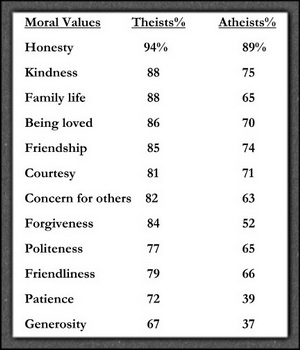
Although the differences between theists and atheists in the importance of values such as honesty, politeness, and friendliness are generally small, moral values emphasized by religious beliefs, such as Christianity, including patience, forgiveness, and generosity exhibit major differences in attitudes (3O%+ differences between theists and atheists).
[FYI, while this book is helpful, I do not recommend this author] Gregory Lessing Garrett, No Apology Necessary Atheism Refuted Eternal Causal Intelligence Affirmed A Comprehensive Compendium of Intelligent Refutations to Atheism (Lulu . com [self-published] November 15, 2018.)
- The strength of the family unit is intertwined with the practice of religion. Churchgoers are more likely to be married, less likely to be divorced or single, and more likely to manifest high levels of satisfaction in marriage.
- Church attendance is the most important predictor of marital stability and happiness.
- The regular practice of religion helps poor persons move out of poverty. Regular church attendance, for example, is particularly instrumental in helping young people to escape the poverty of inner-city life.
- Religious belief and practice contribute substantially to the formation of personal moral criteria and sound moral judgment.
- Regular religious practice generally inoculates individuals against a host of social problems, including suicide, drug abuse, out-of-wedlock births, crime, and divorce.
- The regular practice of religion also encourages such beneficial effects on mental health as less depression (a modern epidemic), more self-esteem, and greater family and marital happiness.
- In repairing damage caused by alcoholism, drug addiction, and marital breakdown, religious belief and practice are a major source of strength and recovery.
- Regular practice of religion is good for personal physical health: It increases longevity, improves one’s chances of recovery from illness, and lessens the incidence of many killer diseases.
So we can see that the above are important factors in a healthy, stable, family which would have the highest percentage or chance in a family situation to create “family values.” What about divorce rates and the 2009 data. This is dealt with well at CHRISTIAN ACTION LEAGUE, and shows how Barna and the Government can miss-categorize whole swaths of people and their affiliations:
…Wright did his own research using the General Social Survey; a huge study conducted by the National Opinion Research Center at the University of Chicago, and found that folks who identify as Christians but rarely attend church have a divorce rate of 60 percent compared to 38 percent among people who attend church regularly. More generally, he found that Christians, similar to adherents of other traditional faiths, have a divorce rate of 42 percent compared with 50 percent among those without a religious affiliation.
And his is not the only research that is showing a link between strong faith and increased marriage stability.
University of Virginia sociologist W. Bradford Wilcox, director of the National Marriage Project, concluded that “active conservative Protestants” who regularly attend church are 35 percent less likely to divorce than are those with no faith affiliation. He used the National Survey of Families and Households to make his analysis.
[….]
Glenn Stanton, the director for family formation studies at Focus on the Family in Colorado Springs, Colo., has been writing articles to spread the truth about the lower divorce rate among practicing Christians.
“Couples who regularly practice any combination of serious religious behaviors and attitudes — attend church nearly every week, read their Bibles and spiritual materials regularly; pray privately and together; generally take their faith seriously, living not as perfect disciples, but serious disciples — enjoy significantly lower divorce rates that mere church members, the general public and unbelievers,” Stanton wrote in the Baptist Press early this year.
At issue in Barna’s studies is how he defined “Christian” and to what other groups he compared the “Christian” divorce rate. Apparently, his study compared what he termed “born-again” Christians — those who described their faith in terms of “personal commitment,” “accept as savior” and other evangelical, born-again language to three other groups, which included self-identified Christians who do not describe their faith with those terms, members of other, non-Christian religions and people of no religious beliefs.
Because his second group would have included many Catholics and mainline Protestants, Wright points out that Barna was, in many ways, “comparing Christians against Christians.” No wonder the rates were similar….
Only one of the top 25 donors to political 527 groups has given to a conservative organization, shedding further light on the huge disparity between Democrats and Republicans in this new fund-raising area. The top three 527 donors so far in the 2004 election cycle – Hollywood producer Steven Bing, Progressive Corp. chairman Peter Lewis and financier George Soros – have combined to give nearly $24 million to prominent liberal groups. They include Joint Victory Campaign 2004, America Coming Together, and MoveOn.org.
Dems the richest five senators?
Financial statements revealed the five richest members of the United States Senate are Democrats. The annual disclosure allows senators to represent their net worth inside a broad range.
Presidential candidate Sen. John Kerry (D-MA) is far ahead of his colleagues with $163 million, most of it coming from his wife’s inheritance of the Heinz fortune. The actual estimate is over $400 million.
Lagging behind is Sen. Herb Kohl (D-WI) at $111 million. The Wisconsin senator’s family owns a department store chain. Sen. John “Jay” Rockefeller (D-WV) comes in third with a personal fortune reported to be $81 million.
Former Goldman Sachs chairman Sen. John Corzine (D-NJ) weighs in at $71 million, with Sen. Diane Feinstein (D-CA) rounding out the top five at $26.3 million. Sen. Peter Fitzgerald (R-IL) breaks the string of Democrat multimillionaires in sixth place at $26.1 million. Sens. Frank Lautenberg (D-NJ), Bill Frist (R-TN), John Edwards (D-NC), and Edward Kennedy (D-MA) complete the top ten.
Democrats are 10 of the top 15 richest senators.
In USA TODAY, David Kinnaman, Barna’s president, said that “the statistical differences reflect varied approaches, with Wright looking more at attendance and his research firm dwelling on theological commitments.” Duh! The bottom line seems to be that the more seriously couples take their faith, the less likely they are to get a divorce. That seems like a self-evident truth, but it appears there is also evidence for it. In other words, this is a nominal, vs. committed Christian vs. secular person battle.
I can go on-and-on, but lets shorten what we have learned, and it all revolves around this:
- “There’s something about being a nominal ‘Christian’ that is linked to a lot of negative outcomes when it comes to family life.”
I realize that much of this can be classified broadly as “The Ecological Fallacy” — but it is an amassing of stats to show that in fact the committed Christian understands the totality of “family values” and commits to them more than the secular person.
1a) Those who attend church more are to be found in the Republican Party;
1b) Those who do not, the Democratic Party;
2a) Those in the Republican Party donate much more to charitable causes;
2b) Those in the Democratic Party, are much more stingy;
3a) Republicans earn less and give more;
3b) Democrats earn more and give less;
4a) Conservative Christians and Jews (people who believe in Heaven and Hell) commit less crimes;
4b) Liberal religious persons (universalists) have a higher rate of crime;
5a) Regular church attendees have a lower drug use rate;
5b) Irreligious persons have a higher rate;
6a) Moral “oughts” are answered in Christian theism (one “ought” not rape because it is absolutely, morally wrong);
6b) Moral “oughts” are merely current consensus of the most individuals, there is no absolute moral statement that can be made about rape;
7a) Republicans are happier than Democrats;
7b) Democrats are more depressed;
8a) The sex lives of married, religious persons is better/more fulfilling;
…According to psychotherapist and couples’ sex expert Esther Perel, marriage is when your sex life really begins…
8b) The sex lives of the irreligious person is less fulfilling;
9a) The conservative is more likely to reach orgasm [conservative woman I assume];
9b) The liberal woman is not;
10a) They are less likely to sleep around, which would also indicate lower STDs;
10b Democrats are more likely to have STDs through having more sex partners;
11a) Republicans are less likely (slightly, but this is so because of the committed Christians in the larger demographic) to have extra-marital affairs;
11b) Democrats more likely;
HAPPINESS IS A MORAL OBLIGATION
Forty-three percent of people who attend religious services weekly or more say they’re very happy, compared to 26 percent of those who go seldom or never. The Pew analysis does not answer the question of how religion, Republicanism and happiness might be related, however.
[….]
Most young people start out as naive, idealistic liberals. But as they get older, that changes. They get more conservative, usually because they grow up. But just imagine that you never get out of that liberal mindset. You go through your whole life trying to check people into a victim box, always feeling offended, always trying to right all of the wrongs in the world, and always blaming government for it. It’s no wonder you’d end up miserable when you get older! Going through your entire life feeling like that would make you a very angry, bitter, jealous, selfish person — and often, that describes aging liberals to a T.
All in all, being a Republican gives you a 7% edge in the happiness department, which doesn’t sound like much, but it’s a greater factor than race, ethnicity, or gender. And just a reminder — Republicans have the advantage across all class lines as well, from upper class to middle class to lower class. Lower class Republicans are happier than lower class Democrats. Middle class Republicans are happier than middle class Democrats. And upper class Republicans are happier than upper class Democrats.
And I’ll say it again. It’s because of the difference in world view.
12a) Republicans over the last three decades have been reproducing more…
12b) Democrats abort more often and have less children through educational/career decisions
13a) Christians are more likely to have children and impact the world;
13b) Skeptics replace family with pleasure and travel.
“Since women that believe in God are less likely to have abortions, does that mean that natural selection will result in a greater number of believers than non-believers.” Assuming the validity of the “underlying instinct to survive and reproduce” then, out of the two positions (belief and non-belief) available for us to choose from which would better apply to being the most fit if the fittest is “an individual… [that] reproduces more successfully…”? The woman that believes in God is less likely to have abortions and more likely to have larger families than their secular counterparts. Does that mean that natural selection will result in a greater number of believers than non-believers?
Also,
- Divorce. Marriages in which both spouses frequently attend religious services are less likely to end in divorce. Marriages in which both husband and wife attend church frequently are 2.4 times less likely to end in divorce than marriages in which neither spouse attends religious services.1
- Mother-Child Relationship. Mothers who consider religion to be important in their lives report better quality relationships with their children. According to mothers’ reports, regardless of the frequency of their church attendance, those who considered religion to be very important in their lives tended to report, on average, a higher quality of relationship with their children than those who did not consider religion to be important.2
- Father-Child Relationship. Fathers’ religiosity is associated with the quality of their relationships with their children. A greater degree of religiousness among fathers was associated with better relationships with their children, greater expectations for positive relationships in the future, investment of thought and effort into their relationships with their children, greater sense of obligation to stay in regular contact with their children, and greater likelihood of providing emotional support and unpaid assistance to their children and grandchildren. Fathers’ religiousness was measured on six dimensions, including the importance of faith, guidance provided by faith, religious attendance, religious identity, denominational affiliation, and belief in the importance of religion for their children.3
- Well-Being of High School Seniors. Among high school seniors, religious attendance and a positive attitude toward religion are correlated with predictors of success and well-being. Positive attitudes towards religion and frequent attendance at religious activities were related to numerous predictors of success and wellbeing for high-school seniors, including: positive parental involvement, positive perceptions of the future, positive attitudes toward academics, less frequent drug use, less delinquent behavior, fewer school attendance problems, more time spent on homework, more frequent volunteer work, recognition for good grades, and more time spent on extracurricular activities.4
- Life Expectancy. Religious attendance is associated with higher life expectancy at age 20. Life expectancy at age 20 was significantly related to church attendance. Life expectancy was 61.9 years for those attending church once a week and 59.7 for those attending less than once a week.5
- Drinking, Smoking and Mortality. Frequent religious attendance is correlated with lower rates of heavy drinking, smoking, and mortality. Compared with peers who did not attend religious services frequently, those who did had lower mortality rates and this relationship was stronger among women than among men. In addition, frequent attendees were less likely to smoke or drink heavily at the time of the first interview. Frequent attendees who did smoke or drink heavily at the time of the first interview were more likely than nonattendees to cease these behaviors by the time of the second interview.6
- Volunteering. Individuals who engage in private prayer are more likely to join voluntary associations aimed at helping the disadvantaged. Individuals who engaged in private prayer were more likely to report being members of voluntary associations aimed at helping the elderly, poor and disabled when compared to those who did not engage in private prayer. Prayer increased the likelihood of volunteering for an organization that assisted the elderly, poor and disabled, on average, by 20 percent.7
- Charity and Volunteering. Individuals who attend religious services weekly are more likely to give to charities and to volunteer. In 2000, compared with those who rarely or never attended a house of worship, individuals who attended a house of worship nearly once a week or more were 25 percentage points more likely to donate to charity (91 percent vs. 66 percent) and 23 points more likely to volunteer (67 percent vs. 44 percent).8
- Voting. Individuals who participated in religious activities during adolescence tend to have higher rates of electoral participation as young adults. On average, individuals who reported participating in religious groups and organizations as adolescents were more likely to register to vote and to vote in a presidential election as young adults when compared to those who reported not participating in religious groups and organizations.9
- Ethics in Business. Business professionals who assign greater importance to religious interests are more likely to reject ethically questionable business decisions. Business leaders who assigned greater importance to religious interests were more likely to reject ethically questionable business decisions than their peers who attached less importance to religious interests. Respondents were asked to rate the ethical quality of 16 business decisions. For eight of the 16 decisions, respondents who attached greater importance to religious interests had lower average ratings, which indicated a stronger disapproval of ethically questionable decisions, compared to respondents who attached less importance to religious interests.10
FOOTNOTES
1. Vaughn R. A. Call and Tim B. Heaton, “Religious Influence on Marital Stability,” Journal for the Scientific Study of Religion 36, No. 3 (September 1997): 382-392.
2. Lisa D. Pearce and William G. Axinn, “The Impact of Family Religious Life on the Quality of Mother-Child Relations,” American Sociological Review 63, No. 6 (December 1998): 810-828.
3. Valerie King, “The Influence of Religion on Fathers’ Relationships with Their Children,” Journal of Marriage and Family 65, No. 2 (May 2003): 382-395.
4. Jerry Trusty and Richard E. Watts, “Relationship of High School Seniors’ Religious Perceptions and Behavior to Educational, Career, and Leisure Variables,” Counseling and Values 44, No. 1 (October 1999): 30-39.
5. Robert A. Hummer, Richard G. Rogers, Charles B. Nam, and Christopher G. Ellison, “Religious Involvement and U.S. Adult Mortality,” Demography 36, No. 2 (May 1999): 273-285.
6. William J. Strawbridge, Richard D. Cohen, Sarah J. Shema, and George A. Kaplan, “Frequent Attendance at Religious Services and Mortality over 28 Years,” American Journal of Public Health 87, No. 6 (June 1997): 957-961.
7. Matthew T. Loveland, David Sikkink, Daniel J. Myers, and Benjamin Radcliff, “Private Prayer and Civic Involvement,” Journal for the Scientific Study of Religion, 44, No. 1 (March 2005): 1-14.
8. Arthur C. Brooks, Who Really Cares: America’s Charity Divide, (New York: Basic Books 2006), 31-52.
9. Michelle Frisco, Chandra Muller and Kyle Dodson, “Participation in Voluntary Youth-Serving Associations and Early Adult Voting Behavior,” Social Science Quarterly 85, No. 3 (September 2004): 660-676.
10. Justin Longenecker, Joseph McKinney, and Carlos Moore, “Religious Intensity, Evangelical Christianity, and Business Ethics: An Empirical Study,” Journal of Business Ethics 55, No. 4 (December 2004): 371- 384.
For these and other reasons not mentioned here I reject the study referenced at the beginning of this post. You can see from the above why this blog is called “Religio-Political Talk,” separating the values of religion from politics is an impossible task. As Wayne Grudem points out:
…Such “exclude religion” arguments are wrong because marriage is not a religion! When voters define marriage, they are not establishing a religion. In the First Amendment, “Congress shall make no law respecting an establishment of religion, or prohibiting the free exercise thereof,” the word “religion” refers to the church that people attend and support. “Religion” means being a Baptist or Catholic or Presbyterian or Jew. It does not mean being married. These arguments try to make the word “religion” in the Constitution mean something different from what it has always meant.
These arguments also make the logical mistake of failing to distinguish the reasons for a law from the content of the law. There were religious reasons behind many of our laws, but these laws do not “establish” a religion. All major religions have teachings against stealing, but laws against stealing do not “establish a religion.” All religions have laws against murder, but laws against murder do not “establish a religion.” The campaign to abolish slavery in the United States and England was led by many Christians, based on their religious convictions, but laws abolishing slavery do not “establish a religion.” The campaign to end racial discrimination and segregation was led by Dr. Martin Luther King Jr., a Baptist pastor, who preached against racial injustice from the Bible. But laws against discrimination and segregation do not “establish a religion.”
If these “exclude religion” arguments succeed in court, they could soon be applied against evangelicals and Catholics who make “religious” arguments against abortion. Majority votes to protect unborn children could then be invalidated by saying these voters are “establishing a religion.” And, by such reasoning, all the votes of religious citizens for almost any issue could be found invalid by court decree! This would be the direct opposite of the kind of country the Founding Fathers established, and the direct opposite of what they meant by “free exercise” of religion in the First Amendment.
Wayne Grudem, Politics According to the Bible [Grand Rapids, MI: Zondervan, 2010], 31.
BOOK RECOMMENDATION:

